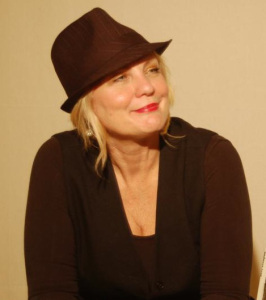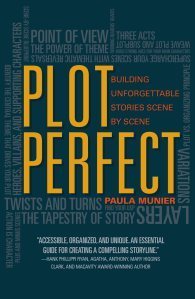Ask the Expert–Paula Munier and Plot Perfect
Welcome Paula Munier to Ask the Expert this Friday. Paula is the author of Plot Perfect: How to Build Unforgettable Stories Scene by Scene.
Think of your favorite story–the one that kept you turning pages late into the night, the one with a plot so compelling, so multilayered, so perfect that you couldn’t put it down. How can you make your own plots–in your novels, short stories, memoirs, or screenplays–just as irresistible?
Plot Perfect provides the answer. This one-of-a-kind plotting primer reveals the secrets of creating a story structure that works–no matter what your genre. It gives you the strategies you need to build a scene-by-scene blueprint that will help elevate your fiction and earn the attention of agents and editors.
By coincidence, this winter, all the Wickeds happened to be working on first drafts at the same time. E-mails flew back and forth. “Using Plot Perfect to help me outline,” Julie wrote. “Using Plot Perfect to figure out a subplot,” Liz said. Here in Key West, my husband Bill, also a writer, and I were passing the book back and forth as we worked on our drafts.
Whoa, I thought. Something is up. So the Wickeds asked Paula here today to answer some questions for us and our readers.
 Barb: You’ve been an editor, an agent and an author. Of all the writing elements, why did you feel a book on plot was needed?
Barb: You’ve been an editor, an agent and an author. Of all the writing elements, why did you feel a book on plot was needed?
Paula: As an agent, I’m always looking for good writers telling good stories. I’m not going to rewrite your stories for you if you’re not a good writer, but if you are a good writer I can help you tell a better story.
As an editor, I spent many years helping writers structure their books. Structure is often where good writers go wrong—especially those new to long-form storytelling. Writing a novel is a marathon, not a sprint. And producing a series is one marathon after another. This can be a challenge for new novelists, who may have only written short stories or essays or news articles before trying their hand at the novel. Those writing crime fiction, where plot is so important, really need to master structure before they shop their work.
I represent—and have sold—many debut authors. I love helping novelists get into print!
Barb: Your book is about plot, but you spend a lot of time on the idea of theme in novels. Why is theme so important, and how does understanding your theme support plotting?
Paula: The book is based on my Plot Perfect boot camps. When Writers Digest first asked me to do a plot-related boot camp, I wanted to come up with a different approach to plot. And I chose the theme-related approach to plot, because I’ve seen too many manuscripts that read like video games—all action but no theme. Plot is what happens; theme is what it means. Theme is what your story is really about. I see too many stories that aren’t really about anything—they’re just one action after another. There’s no there there.
For crime fiction, theme is paramount. The themes in this category are big: good vs. evil, kill or be killed, the search for the truth, the nature of justice, society vs. the individual, chaos vs. order, etc. Readers expect crime fiction writers to tackle these big themes—and weave them right into the plot.
Barb: One of the things the Wickeds loved about your book is that while the concepts used in writing a novel can be quite abstract, you make them concrete by providing many, many examples. How long did it take you to write Plot Perfect, how did you find the examples and what criteria did you use to select them?
Paula: I had six months to write the book, but I’d been running the Plot Perfect boot camps for a couple of years already, so I knew the material fairly well. (I also teach at the Algonkian New York Pitch conferences, as well as other venues.)
I use a lot of examples because, as you say, it helps writers extrapolate, and apply what I’m talking about to their own work. I tend to use examples from the writers I love—from Shakespeare and Jane Austen to Dashiell Hammett and Alice Hoffman and Robert B. Parker—as well as the blockbusters that struck a chord with readers—Gone Girl, Eat Pray Love, etc.
Also, I’d be remiss not to acknowledge that my editor at Writers Digest, Rachel Randall, is an even bigger believer in examples then I am—she had me add even more!
Barb: You look at so many books. As an agent, what do you think is the make-or-break? What single element most frequently causes you to take on a book? What single element most frequently causes you to reject it?
Paula: In today’s marketplace, your work really needs a USP: unique selling proposition. That’s marketing speak for being able to set your work apart from the competition. That often boils down to high-concept. Even in cozies, it’s often the cozies with well-defined premises/settings/USPs—the organic farming mystery, the cake decorating mystery, the Pennsylvania Dutch mystery, etc.—that win the contracts.
I always advise writers to read widely in their category—you’d be surprised how many writers don’t! You should pay particular attention to those debut authors who have broken out in the past three years. This is the competition that you’ll need to position your work against.
In terms of clients: I’m looking for a great writer with a story with a strong USP that I think I can sell. If I can’t boil it down to a 50-word pitch, I can’t sell it. That said, I’m a sucker for any writer with a strong voice. I try to stick to the categories I know well and have a soft spot for as a reader: women’s fiction, mainstream fiction, high-concept Sf/fantasy, YA fiction, any kind of crime fiction, as well as nonfiction.
Mostly I pass on projects because 1) the writer’s level of craft is not high enough for prime time yet; 2) the story idea isn’t strong enough; and/or 3) it’s just not my kind of project. Also, I won’t work with any writer who resists revision or refuses to take marketing and promoting her work seriously.
Barb: You’re a writer, too. What are you working on now?
Paula: Thanks for asking! I just finished a new book for Writers Digest called Writing with Quiet Hands: Notes on a Writer’s Craft, in which I talk about what it means to create good stories for today’s changing publishing landscape, and the finer points of craft that can make the difference between getting publishing and not getting published.
I’m also working on a new novel.
Barb: Thanks Paula. Readers, if you have questions or comments for Paula, fire away!
About Paula Munier: Writers are my tribe. I began as a journalist, and over the years I’ve penned countless new stories, articles, essays, collateral, and blogs, as well as authored/co-authored more than a dozen books, most recently Fixing Freddie, 5-Minute Mindfulness, and A Miscellany of Murder. Along the way, I’ve added editor, acquisitions specialist, digital content manager, and publishing executive to my repertoire—the common denominator being my commitment to writers and writing, no matter what my title. From Gannett, Greenspun, and Prima Games to Disney, Quayside, and F+W Media, I’ve fought the good fight for good writing and good writers. And I’ve loved every minute of it.
But now, as an agent, I have the opportunity to support talented writers in the most direct manner possible, helping my clients do good work, land great publishing deals, and build successful writing careers. So if you’re a writer as obsessed with words and stories as I am, and you’re in it for the long haul, consider working with me. My specialties include mystery/thriller, SF/fantasy, romance, YA, memoir, humor, pop culture, health & wellness, cooking, self-help, pop psych, New Age, inspirational, technology, science, and writing.
Filed under: Ask the Expert Tagged: How to write a novel, literary agent, Paula Munier, Plot Perfect





